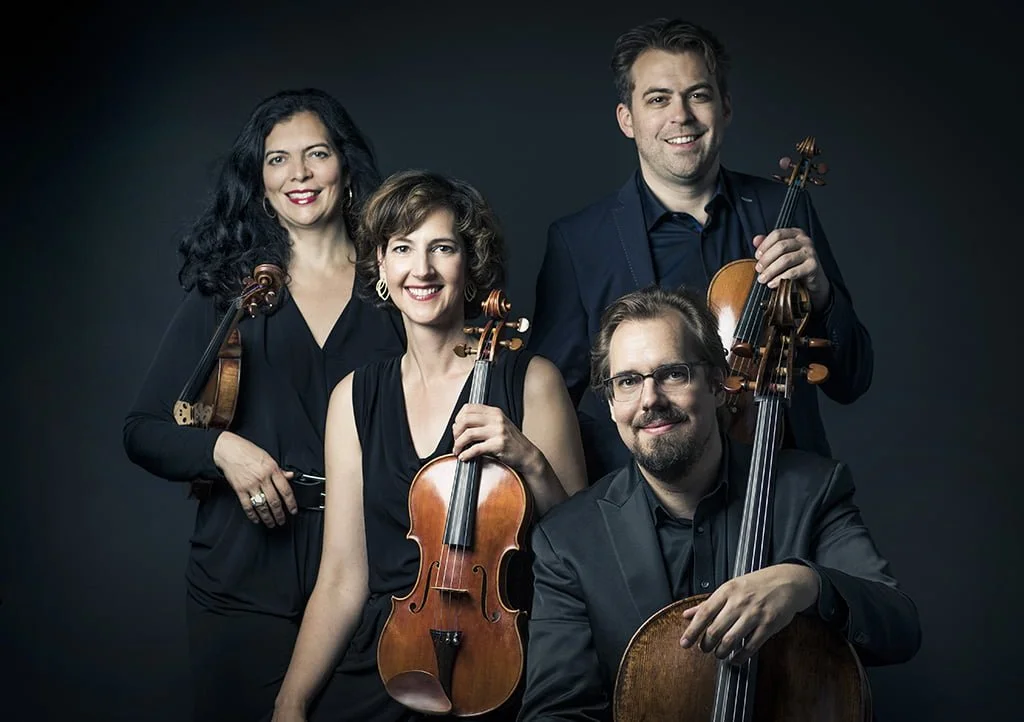Stir Q&A: Gropius Quartet violinist Friedemann Eichhorn talks musical friendships, Mendelssohn, and more
The critically acclaimed German group, named for an architect, is ready to make its Vancouver debut with Friends of Chamber Music
Gropius Quartet.
Friends of Chamber Music presents the Gropius Quartet at the Vancouver Playhouse on October 15
THE GROPIUS QUARTET FIRST burst onto the scene in 2018, with a fresh and energetic approach that has drawn praise from the German musical press. “This quartet plays on four instruments, but with one soul,” raved Klassik-begeistert. As the foursome prepare to make their Vancouver debut this month, on the heels of their first studio album release, violinist Friedemann Eichhorn took time to answer a few questions for Stir:
How did you and your colleagues first come together as an ensemble?
We met at school [the International Menuhin Music Academy in Gstaad and New York’s Juilliard School], but our paths have crossed even more since then, to today: Alexia, Wolfgang and I teach at the same school, the University of Music Franz Liszt in Weimar. Indira and Alexia play together in the amazing Berlin Chamber Philharmonic Metamorphosen that is conducted by Wolfgang. And Wolfgang and I work together in the Kronberg Academy, a wonderful school for some of the world’s greatest young string talents. But most important: Indira and Wolfgang are married, and Alexia and I are married. Our great friendship and love for chamber music resulted in founding the Gropius Quartet.
Unlike many other chamber groups who often take their names from composers, your group is named after the famed architect, Walter Gropius. How and why did you come to choose this as your name?
We are fascinated and inspired by Walter Gropius, who is regarded as a revolutionary visionary and who founded the Bauhaus style in the 1920s. His work is characterised by clarity and boldness. This is what we try to express in our interpretations. And Weimar and Berlin, our hometowns, were to become the centres of Gropius’s creative work.
Your program in Vancouver includes Haydn’s “joke” quartet, along with Shostakovich’s Quartet No. 8, and Mendelssohn's last major composition. Why did you choose to pair these works together?
Our goal is to present a wide range of musical characters and atmospheres. All these three works are great masterpieces and stand for themselves. Haydn is joyful and witty, including a cat caricature in one movement, and the real joke is the ending of the piece. In highest contrast, the Shostakovich is one of the works that represent incredible deep emotions. Shostakovich expressed a feeling that is unfortunately so actual in many parts of our world.
[Felix] Mendelssohn tells the story of love right after the death of his beloved sister Fanny. The work is full of drama and Felix’s sorrow; the third movement is one of Felix’s most romantic and melodious genius creations. It displays hope and beauty.
All of the members of the Gropius have busy artistic lives as soloists and orchestral players. How do you balance all your responsibilities and make time to come together as a cohesive group?
The different musical experiences of solo playing, orchestra playing and teaching have a great impact on our quartet work. It’s so interesting and rewarding to include these elements in the cosmos of a quartet. Quartet playing is much more than four homogenized voices: we look for musical dialogues and conversations balancing equality but also individuality such as strong counterpoints.
Every group can have artistic differences at times. How do you resolve conflicts when they arise?
Different musical ideas are very important, to find the most convincing expression while serving the composer. The way we work is very democratic; we give the person that has a creative idea the necessary time to rehearse the idea until it works well, and then only decide afterwards.
Often, great ideas are neglected without trying them intensively enough. In contrast, a special idea might turn out to be a fascinating musical result if you give the idea time to develop! And certainly, ensemble playing is much about empathy. ![]()













